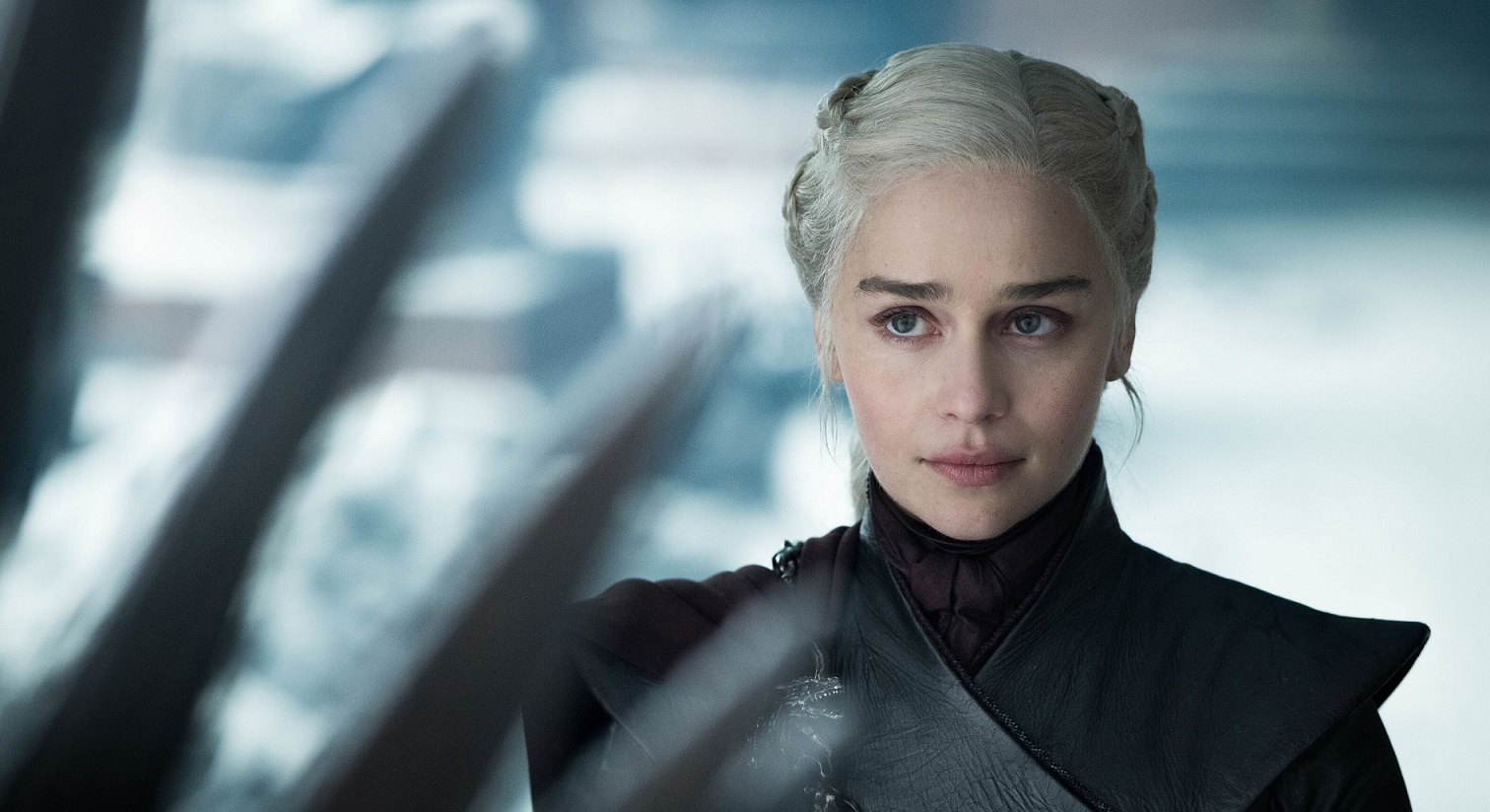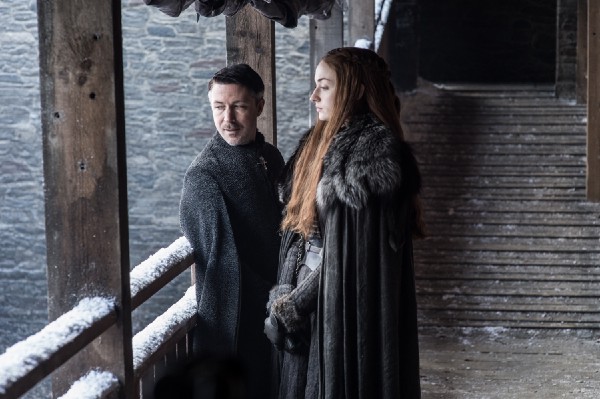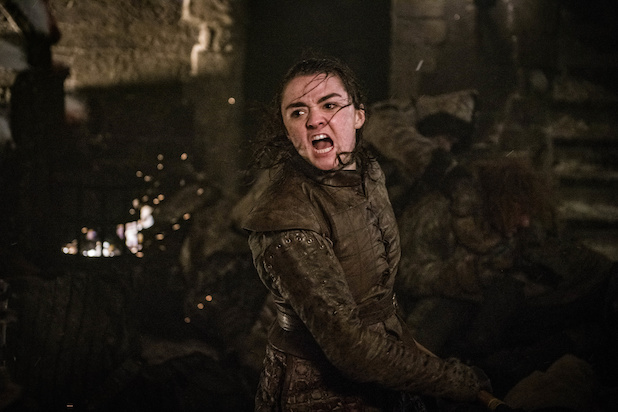What Game of Thrones Teaches Us About Innovation

Image: A scene from Season 8 of Game of Thrones. Photo: HBO.
By Damian Alessandro ’19
The Innovation Studies program at Pacific Lutheran University is interested in the diverse environments innovation can be found in, including the entertainment industry. The popularity of HBO’s blockbuster show, Game of Thrones, highlights an important place to study innovation principles. Spoiler warning for the final season.
“When you play the game of thrones, you win or you die,” says Cersei Lannister to Ned Stark—the lead character and hero of Game of Thrones—right before he is imprisoned and executed in Season 1. Not only does the moment of Ned’s execution shock the audience by ignoring an established rule of television—do not kill your main character, especially in Season 1—it set the tone for what Thrones would continue to do until its completion.
HBO’s adaptation of George R.R. Martin’s fantasy series, A Song of Ice and Fire, became a global phenomenon very unexpectedly in the last decade and millions tuned in to watch the culmination of the show in May 2019. With its penchant for punishing even the most noble of characters with a grisly end, it was obvious that whatever way the show ended, it would be bittersweet at best.
The series finale was incredibly divisive, leaving the audience struggling to come to terms with the end of a show that has dominated pop culture and seems to have rushed to its ending. As many as 1.5 million fans, a number which is growing, have signed a petition to remake the entire final season, a scheme as doomed as Daenerys’ and Jon’s relationship.
Whatever way the show ended, it continued to do what it had been doing all along: subverting expectations and creating discussions about what was great and what wasn’t so much. And as we reflect on the shows’ successes and failures, many of us are asking what we can learn from the series’ use of innovation strategies, and the value of simply throwing out the rules now and then.
It isn’t about Ideas, it’s about Solving Problems
HBO was searching for a successor to its hit series The Sopranos when David Benioff and D.B. Weiss pitched the idea of Game of Thrones. The idea did not immediately scream success, especially since the network’s only real connection to the fantastical was True Blood, a show that was not as defining as they wanted it to be. The challenge was that they needed a show that could captivate audiences.
Weiss and Benioff offered a series which, much like The Wire, was trying to tell a sociological story instead of a psychological one. Rather than being concerned solely with individual characters and their struggles in a small environment, Game of Thrones would tell the story of several characters spread out across different continents, exploring the facets of the society that shaped them. Game of Thrones was the right show in a wrong time; a decade where politics became increasingly unsettling and things didn’t make much sense. It was easier to confront these realities in a show which centered on Machiavellian power struggles while catering to the viewers’ sense of wonder with dragons, zombies, and more.
Though Weiss and Benioff were fantasy fanboys without any show-running experience, HBO’s heads of programming, Michael Lombardo and Richard Pleper (now CEO of HBO), were won over by the themes at the core of the story: love, hate, power, and validation. Themes which characterize the political strife of the decade; what better show to capture the zeitgeist?
This wasn’t a clear solution to HBO’s problems at first, but the show would grow into a winner as the first season moved along. Thrones popularity was due, in part, to the creative ways that its characters were able to solve their long list of problems. This is perhaps best summed up in the challenges facing the character of Petyr Baelish.
Baelish was a man caught up in a not-so-classic rags-to-riches story, which begins with him falling in love with the Lady Catelyn Tully, and continues with him trying to fight for Tully’s hand against what he perceived as a bully in Eddard Stark’s older brother. Rather than win like any great hero would, Baelish is humiliated and injured, learning that he needs to play the Game in a different way to get what he wants. Over the next few decades, Baelish schemes his way into the role Master of Coin, where we first see him in the series, and he makes it clear that he is aiming, ultimately, for the Iron Throne.

Baelish’s maneuvers present like a deliberate game of chess. He can’t marry Catelyn because she is married to Ned Stark (so Baelish removes Ned Stark). Catelyn dies unexpectedly in the ensuing war (so Baelish goes for Catelyn’s daughter Sansa). Sansa is accused of murdering the King (so Baelish spirits Sansa away to the Vale, which he controls with his conniving wife, Lady Lysa Tully). Baelish kills Lady Tully to gain sole control of the Vale, then marries Sansa to the Boltons. He tells the Queen Regent that he has found Sansa and promises to bring her to justice… if he can become Warden of the North. And so it goes.
Is there anything in this story that feels like the process of innovation?
Much like Baelish’s view of chaos, innovation can be conceived of a ladder with many rungs. Many try to climb the ladder and fail, clinging to traditional notions and never going very far with them. Others are able to navigate the maze (to see where their ideas have new applications), and then they use their adaptations to climb. Innovation is not easy; in fact, it often feels messy and out-of-sync with the world. Looked at from above, the innovation process is about finding solutions to problems of increasing complexity, adapting your approach to each new obstacle. In the case of Game of Thrones, it is this approach that Baelish used to move up the ladder.
Iterative Innovation vs Disruptive Innovation
“What unites people? Armies? Gold? Flags?” Tyrion Lannister asked these fundamental questions in the Game of Thrones series finale. He then answered his own question: “Stories. There’s nothing in the world more powerful than a good story. Nothing can stop it. No enemy can defeat it.” It was a self-aware line inserted into the show’s conclusion about the program’s biggest strength (and its main concern).The foundations of strong storytelling in this show are due to a balance in discovery and duplication.
Game of Thrones set out to explore its milieu in a way that other popular works have not. Thrones is more interested in how society affects a broad range of people, and the consequences that result from this exploration, rather than just the psychology of a few characters over time. This set the stage for the contest of the Iron Throne by creating a story that could progress even as its main characters died, often in brutal and disheartening ways.
In order to create a compelling story, the show relies on iteration, or refining the process of innovation over time. In other words, it presents, then subverts, popular narratives.
Initially, Eddard Stark is an honest and likable figure who uncovers a dark secret embedded in political intrigue. The audience expects the tale to unfold with him working to reveal this secret, and its political fallout, in the coming seasons. But before Stark gets a chance to complete this work, he is executed.
Ned Stark’s execution paves the way for his oldest legitimate son, Robb Stark, to enter into the avenging role as successor. Honorable and skilled in warfare, Robb eventually falls in love, choosing to betray an oath to be with the woman he wants. Justice, following the heart and forbidden love, feel like attractive themes for the audience. However, when forced to work with the man he betrayed, Robb Stark is also brutally murdered (this time, at an uncle’s wedding).
Game of Thrones walks a delicate balance between providing stories that seem familiar to us, and ensuring that the stories follow the rules of the Game. Any single mistake, however small, lead to cataclysmic consequences in this master narrative, and the mistakes weigh heavily on other characters’ decisions.
This iterative process is not only present in the storytelling, but in the actions of the characters as well, such as Tywin Lannister’s repudiation of his authority through infrequent (but very terrible) acts every now and again. Whether it was the Reynes of Castamere or the Starks and their bannermen under Walder Frey’s hospitality, Tywin clearly established his reputation as a man who “pays his debts,” deterring anyone from crossing the Lannisters.
The entertainment industry as a whole thrives on this balance between being iterative and disruptive. Game of Thrones has helped to introduce a Second Golden Age of Television, bringing no shortage of networks and showrunners eager to imitate (and usurp) its success. The game over who sits on television’s metaphorical Iron Throne has become increasingly pressing because of the series ending. As a void opens up and the question has shifted from “What will replace the Sopranos?” to “What will replace Game of Thrones,” it is unclear whether the audience is as hungry for new shows to fill that space as networks are to provide them.
Innovation often comes unexpectedly and leads to unknown results
While the storytelling of Game of Thrones earlier seasons was praised by fans and critics, it has received considerable backlash for its latter seasons, especially Season 8. This is partly due to the series moving past the familiar terrain of the books. In addition, the show runners Benioff and Weiss have failed to maintain the creative storytelling that was consistent in the books. Rather than remain a core focus on the sociological, Thrones became focused on individual heroics and villainy, making it more difficult to kill off major characters. Rather than subverting expectations in a way that was emotionally succinct and logical according to the rules of the Game, unexpected things have happened solely for the sake of shocking or enticing the audience.
For example, during the Long Night, Arya randomly kills The Night King with super assassin skills after virtually no relational development between the characters over the last eight seasons. The Battle of Winterfell also provided major, beloved characters with sudden invincibility against the undead multitude. While this was set up (in part) there wasn’t sufficient emotional weight assigned to the events of the episode, and The Long Night ended up being anti-climactic. This left many viewers impressed with the spectacle of the battle, but confused by its turn-out.

Daenerys’ magnetic aspiration to break the wheel of oppression sees her go from sex slave to conquering Mother of Dragons over eight seasons, only to burn everything she worked so hard to gain in the course of two episodes. She is also murdered by the love of her life. Like Dany, Game of Thrones unexpectedly rose to the top of television, eager to tell a story the small screen had never seen before… and then it fumbled its ending, rushing to put each character in the place that George R.R. Martin likely told Benioff and Weiss they would finish in.
But also like Daenerys, whose actions still broke the wheel, abolishing slavery in three large city states and leading to the development of a new government with a focus on empathy and restoration rather than retribution, Game of Thrones changed the landscape of television and ushered in a new age.
Since the show first aired, the amount of scripted shows airing in the United States has gone from 266 in 2011 to 495 in 2018, rising 86 percent. By its final season, Game of Thrones was operating on a budget of $15 million an episode, raising the bar for production value and speed. The show may have had a dissatisfying ending for many, but it is the most watched show on television, its final season averaging 44.2 million viewers, according to HBO.
The buzz of social media has made television a constant topic of discussion on the Internet, and the contentious elements of Game of Thrones – its attention to detail, different twists and revelations, as well as shocking events – have positioned it at the front of the debate. The show is so-called ‘event television,’ a spectacle that demands to be seen as it saturates pop culture. Even for those who don’t watch it, they are surrounded by its influence. As each episode finished, there was an collective all-consuming desire to know “What Happens Next.” It is to modern television what Star Wars was to the Second Golden Age of movies in the 1970s. And it most likely will be the last of its kind.
The non-serialized, binge-worthy model of releasing an entire season at once, introduced by Netflix and followed now by other streaming services, seems unable to create the same spectacle and shared collective experience of the weekly Game of Thrones phenomenon. Amazon spent $200 million just to buy the rights to adapt the popular fantasy series Lord of the Rings, which may take up to $1 billion to make. Apple, Disney, and HBO will be adding in their own high budget fantasy/sci-fi epic series to compete in this new era of “Peak T.V.”
Despite all of the new shows coming, it is hard to imagine whether or not they will be able to do something different in the vein of Game of Thrones. What rules can they break or new directions can they take us? While we can reflect on what made something so innovative in hindsight, it is often hard to tell when something will change the game so drastically. Ultimately it will come from a place that we don’t see coming. For now, though, a decade-defining show has come to a close and our watch has ended.
Damian Alessandro is a recent graduate of Pacific Lutheran University, where he majored in History and minored in Innovation Studies and Chinese Studies. If you are interested in more of his work or have questions or comments about this article, you can reach him at dhender97@gmail.com.


